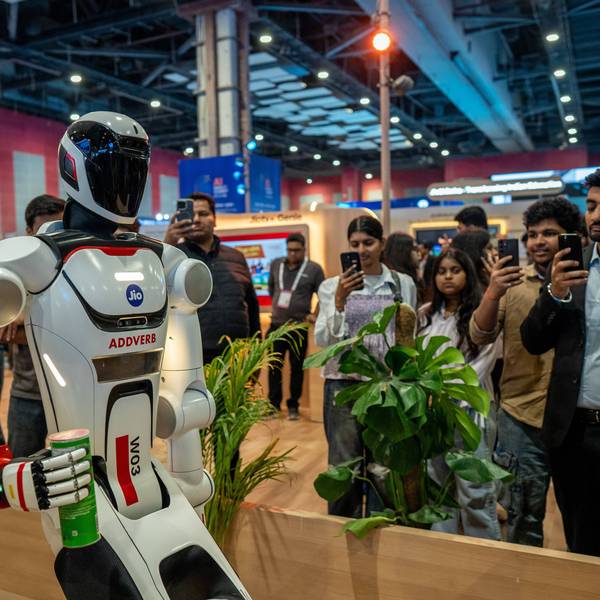
AI pioneer Yoshua Bengio, seen here in 2017, told the journal Nature that "we have to raise flags before bad things happen" in terms of irresponsible use of artificial intelligence.(Photo: Ecole polytechnique/flickr/cc)
Pioneer in Field Warns Dangers Posed by Artificial Intelligence 'Very Real'
"What is most concerning is not happening in broad daylight"
A pioneer in the field of artificial intelligence warned that "dangers of abuse" of AI "are very real."
The warning from Canadian computer science professor and leading AI researcher Yoshua Bengio came in a Q&A with the journal Nature published Thursday.
The interview was conducted back in January, before Bengio was named along with two others the latest recipients of the Turing Award, a prize dubbed the "Nobel Prize of Computing."
Bengio told Nature that "we have to raise flags before bad things happen" in terms of irresponsible use of AI.
Unfortunately, "what is most concerning is not happening in broad daylight" but "in military labs, in security organizations, in private companies providing services to governments or the police," he said.
In particular, Bengio said, he is concerned with so-called killer drones--lethal autonomous weapons--and surveillance, which can be abused by authoritarian governments.
AI "can be used by those in power to keep that power, and to increase it," said Bengio, and be used "to worsen gender or racial discrimination."
Some sort of government or international regulatory framework needs to be in place to put a check on AI, added Bengio: "Self-regulation is not going to work."
It's not the first time Bengio expressed concerns about possible abuse of AI. This week he joined over two dozen other AI researchers in calling on Amazon to stop selling its facial-recognition software Rekognition to police departments.
The group of "concerned researchers" wrote in a post on Medium that "legislation and safeguards to prevent misuse are not in place."
Bengio also served on the steering committee for the recently-unveiled Montreal Declaration for Responsible Development of Artificial Intelligence. Among the declaration's 10 principles are that the "development and use of [artificial intelligence systems] AIS must contribute to the creation of a just and equitable society."
"Generally speaking," he wrote at The Conversation highlighting the need for the declaration, "scientists tend to avoid getting too involved in politics. But when there are issues that concern them and that will have a major impact on society, they must assume their responsibility and become part of the debate."
"And in this debate, I have come to realize that society has given me a voice--that governments and the media were interested in what I had to say on these topics because of my role as a pioneer in the scientific development of AI."
"So, for me, it is now more than a responsibility," he said. "It is my duty. I have no choice."
An Urgent Message From Our Co-Founder
Dear Common Dreams reader, The U.S. is on a fast track to authoritarianism like nothing I've ever seen. Meanwhile, corporate news outlets are utterly capitulating to Trump, twisting their coverage to avoid drawing his ire while lining up to stuff cash in his pockets. That's why I believe that Common Dreams is doing the best and most consequential reporting that we've ever done. Our small but mighty team is a progressive reporting powerhouse, covering the news every day that the corporate media never will. Our mission has always been simple: To inform. To inspire. And to ignite change for the common good. Now here's the key piece that I want all our readers to understand: None of this would be possible without your financial support. That's not just some fundraising cliche. It's the absolute and literal truth. We don't accept corporate advertising and never will. We don't have a paywall because we don't think people should be blocked from critical news based on their ability to pay. Everything we do is funded by the donations of readers like you. Will you donate now to help power the nonprofit, independent reporting of Common Dreams? Thank you for being a vital member of our community. Together, we can keep independent journalism alive when it’s needed most. - Craig Brown, Co-founder |
A pioneer in the field of artificial intelligence warned that "dangers of abuse" of AI "are very real."
The warning from Canadian computer science professor and leading AI researcher Yoshua Bengio came in a Q&A with the journal Nature published Thursday.
The interview was conducted back in January, before Bengio was named along with two others the latest recipients of the Turing Award, a prize dubbed the "Nobel Prize of Computing."
Bengio told Nature that "we have to raise flags before bad things happen" in terms of irresponsible use of AI.
Unfortunately, "what is most concerning is not happening in broad daylight" but "in military labs, in security organizations, in private companies providing services to governments or the police," he said.
In particular, Bengio said, he is concerned with so-called killer drones--lethal autonomous weapons--and surveillance, which can be abused by authoritarian governments.
AI "can be used by those in power to keep that power, and to increase it," said Bengio, and be used "to worsen gender or racial discrimination."
Some sort of government or international regulatory framework needs to be in place to put a check on AI, added Bengio: "Self-regulation is not going to work."
It's not the first time Bengio expressed concerns about possible abuse of AI. This week he joined over two dozen other AI researchers in calling on Amazon to stop selling its facial-recognition software Rekognition to police departments.
The group of "concerned researchers" wrote in a post on Medium that "legislation and safeguards to prevent misuse are not in place."
Bengio also served on the steering committee for the recently-unveiled Montreal Declaration for Responsible Development of Artificial Intelligence. Among the declaration's 10 principles are that the "development and use of [artificial intelligence systems] AIS must contribute to the creation of a just and equitable society."
"Generally speaking," he wrote at The Conversation highlighting the need for the declaration, "scientists tend to avoid getting too involved in politics. But when there are issues that concern them and that will have a major impact on society, they must assume their responsibility and become part of the debate."
"And in this debate, I have come to realize that society has given me a voice--that governments and the media were interested in what I had to say on these topics because of my role as a pioneer in the scientific development of AI."
"So, for me, it is now more than a responsibility," he said. "It is my duty. I have no choice."
A pioneer in the field of artificial intelligence warned that "dangers of abuse" of AI "are very real."
The warning from Canadian computer science professor and leading AI researcher Yoshua Bengio came in a Q&A with the journal Nature published Thursday.
The interview was conducted back in January, before Bengio was named along with two others the latest recipients of the Turing Award, a prize dubbed the "Nobel Prize of Computing."
Bengio told Nature that "we have to raise flags before bad things happen" in terms of irresponsible use of AI.
Unfortunately, "what is most concerning is not happening in broad daylight" but "in military labs, in security organizations, in private companies providing services to governments or the police," he said.
In particular, Bengio said, he is concerned with so-called killer drones--lethal autonomous weapons--and surveillance, which can be abused by authoritarian governments.
AI "can be used by those in power to keep that power, and to increase it," said Bengio, and be used "to worsen gender or racial discrimination."
Some sort of government or international regulatory framework needs to be in place to put a check on AI, added Bengio: "Self-regulation is not going to work."
It's not the first time Bengio expressed concerns about possible abuse of AI. This week he joined over two dozen other AI researchers in calling on Amazon to stop selling its facial-recognition software Rekognition to police departments.
The group of "concerned researchers" wrote in a post on Medium that "legislation and safeguards to prevent misuse are not in place."
Bengio also served on the steering committee for the recently-unveiled Montreal Declaration for Responsible Development of Artificial Intelligence. Among the declaration's 10 principles are that the "development and use of [artificial intelligence systems] AIS must contribute to the creation of a just and equitable society."
"Generally speaking," he wrote at The Conversation highlighting the need for the declaration, "scientists tend to avoid getting too involved in politics. But when there are issues that concern them and that will have a major impact on society, they must assume their responsibility and become part of the debate."
"And in this debate, I have come to realize that society has given me a voice--that governments and the media were interested in what I had to say on these topics because of my role as a pioneer in the scientific development of AI."
"So, for me, it is now more than a responsibility," he said. "It is my duty. I have no choice."

